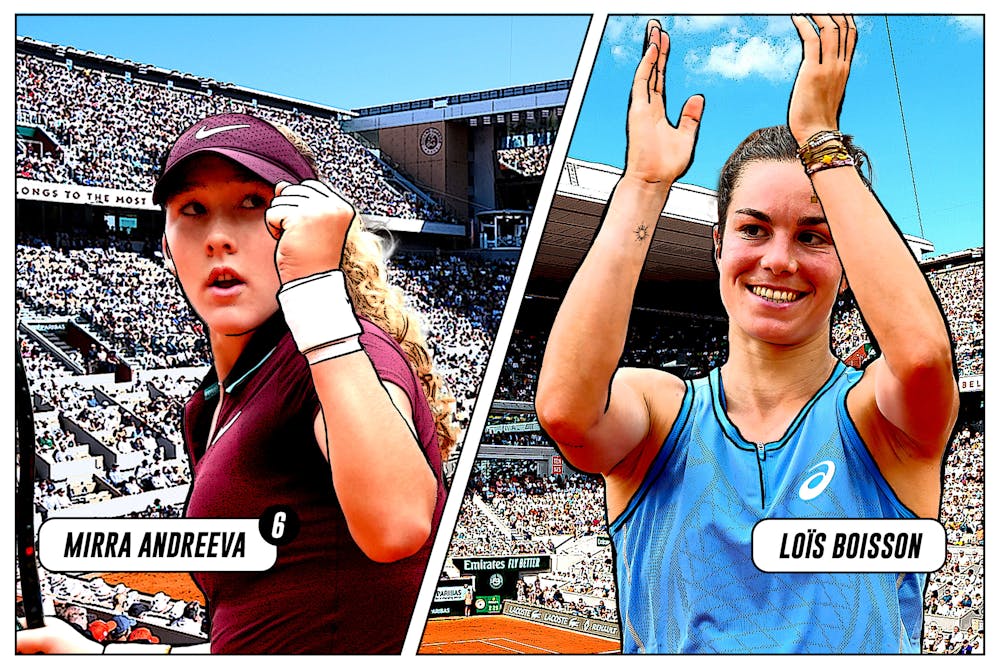Feature
What next for Lois Boisson?
 ©Nicolas Gouhier / FFT
©Nicolas Gouhier / FFTLois Boisson's run at Roland-Garros 2025 renders the usual stats meaningless

Court Philippe-Chatrier, second match
Mirra Andreeva (6) vs Lois Boisson (WC)
We begin with an apology: there will be no stats on Lois Boisson in this preview.
The reason is simple: hers is such a fairytale story, the wild card with the lowly ranking who has battled her way into the quarter-finals of her home Grand Slam, that number crunching is useless. Irrelevant, even. Her first serve percentage or break point conversion rate doesn’t matter; it is only the story that counts.
When she came back from a set down to beat Jessica Pegula on Monday, Court Philippe-Chatrier was full of French fans. Some were on the edge of their seats; some were on the edge of tears – this was true drama and their heroine did not disappoint. She soaked up the applause and then roared with delight.
“I will not believe it if you tell me two weeks ago [that I would be in the quarter-final],” she said. “But I trust in myself, but for sure, if you told me that, no, I wouldn’t believe it. Now it's true, and I'm so happy about it.”
To be fair, no one would have believed it. Just before last year’s Roland Garros, she tore her left ACL and needed surgery. It was a career-threatening injury and she did not get back to the tour until February of this year. From a ranking of No.152, she dropped to No.230 by the time of her comeback and this week is No.361. And yet she is in the quarter-finals.
There is a coolness in Lois. It would be easy for the 22-year-old rookie to get caught up in the hype and the hoopla (she is the first Frenchwoman to do so well here since 2017) but not Lois. She even took the fact of playing on the famous show court for the first time in her stride.
“I didn't feel any more pressure than for other matches,” she said, calmly. “The more matches I play here, the better I feel. I tried to stay rather cool and focused on what I had to do to relieve the pressure, because I did feel the pressure.
“If I missed a point, I tried to think why I had missed it and how I could improve for the next one.”
There are Grand Slam champions who have tried – and failed – for a lifetime to collect their thoughts like that. It obviously takes a lot to ruffle Lois.
Mirra Andreeva is the next to try. The world No.6 was in Boisson’s shoes a couple of years ago: the young star who marched onto the clay court stage and stole the show. In her second full season on tour, she is hoping to reach her second, consecutive semi-final here and she thinks she knows how to do it.
 ©Cédric Lecocq / FFT
©Cédric Lecocq / FFTMirra Andreeva
“I have improved physically. I think I am much stronger than I was two years ago,” she said after beating Daria Kasatkina a couple of days ago.
“I'm much more positive right now on the court, and I think that also is one of the keys for me. And I'm always trying to now always fight for every point no matter what happens. I think that for me, the most important two points that changed is I improved physically and also mentally.”
It is the French fairytale against the teenage phenom. No stats required.
Court Philippe-Chatrier, first match
Madison Keys (7) v Coco Gauff (2)
Two Americans, two Grand Slam winners, only a handful of ranking spots between them – how to pick a favourite?
Their history gives a hint: Madison Keys (or Maddie) has won three of their five meetings and has won on three different surfaces. The most recent was on the Madrid Clay last year – Maddie won in three tight sets – but even then, it does not give a clear indication of what might happen in this quarter-final.
“For me it's going to be a lot about trying to balance going after things, but knowing with her ability to cover the court, you're going to have to win the point multiple times before it's actually over,” Keys said.
“You also have the threat against her of if at any point you kind of lose control of the point, she's going to be the aggressor.”
Those talents took Coco Gauff to the final here three years ago and the finals of Madrid and Rome in the past couple of months.
Court Philippe-Chatrier, third match
Jannik Sinner (1) v Alexander Bublik
Where to start with this one? We all know what Jannik Sinner brings to the table – power, precision, relentlessly impressive ball striking – but Alexander Bublik? He can be all things to all matches. And usually is.
He described his four set dissection of Jack Draper in the last round as “100 per cent one of the best days of my life and one of the best matches I have ever played in my life. That was as simple as that.”
With every shot in the book (and a few that aren’t), Bublik should have won more and done better at the Grand Slams but he has struggled to focus over the years. Many of his matches have had more ups and downs than a funfair ride with the result that he has missed his chance to compete consistently at the very top of the sport.
But if he can play against Sinner the way he played against Draper, this quarter-final could be a thriller.